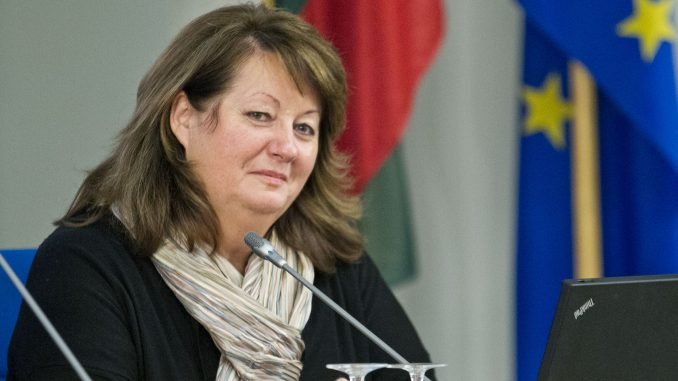
With the pandemic simmering out in Lithuania, voters have rated both the ruling politicians and those in the opposition, Lrytas.lt wrote in its editorial section Laiko ženklai. The Social Democrats, who elected MEP V. Blinkevičiūtė their chairwoman, should perhaps celebrate their score the most, with her having clearly boosted the party’s ratings.
This is evidenced by V. Blinkevičiūtė‘s personal popularity indicators.
The newest Vilmorus survey saw this politician fly right up to second place after President G. Nausėda in the most positively perceived politicians’ line-up.
As a reminder, in this survey, voters are asked their opinion about party leaders, cabinet members and the Vilnius and Kaunas city mayors, which meant that the MEP was previously not included in the list of politicians to rate.

Her debut is indeed impressive – almost 50% of respondents were of a favourable opinion of her, while only 17% – unfavourable.
Called the Lithuanian pensioners’ mother a little ironically, V. Blinkevičiūtė has maintained popularity since back in 2000-2008 when she managed to sensitively console the most impoverished individuals while she was the minister of social security and labour.
That said, in 2004, V. Blinkevičiūtė sought the post of president and didn’t even enter the second round. However, voters were never hostile towards her – she was later constantly elected to the European Parliament.
After withdrawing into the side-lines of Lithuanian political life, this politician should seemingly have been forgotten already. However, it sufficed for her to return to the domestic political waters and a significant portion of people received her gladly.
This is confirmed by another indicator in the survey, which asks what individual the people perceive as best representing their interests.
It is no coincidence that this question has been described as scouting for the presidential elections because the survey respondents choose a single politician without any prompts.
After becoming the head of the Social Democrats, V. Blinkevičiūtė found herself rising high in this as well – she was chosen by 6.6% of respondents, which lands her in third place, just behind President G. Nausėda and Prime Minister I. Šimonytė.
Of course, it is too early for the Social Democrats to celebrate that their leader could win in the presidential elections along the lines of what Jonava Mayor M. Sinkevičius trumpeted during the party congress.
One way or another, V. Blinkevičiūtė being elected also led to a fairly sudden jolt in the Social Democratic Party’s popularity from 6.8% in April to 10.2% in May. This allowed it to settle in at third place in the party rankings, right after the “Farmers” and Conservatives.
On the other hand, these aren’t exactly the ratings the Social Democrats dream of, they have been higher. Just last summer, with the Seimas elections nearing, voters viewed the party not much less than now, with 9.1% prepared to vote for it.
It appears that V. Blinkevičiūtė is aware of the fragility of the Social Democrats’ circumstances. During the party congress, she spoke about how they must prove to voters that they are the only truly left-wing party in Lithuania.
Thus, the politician’s declaration that the Social Democrats will not flirt with the “Farmers” is rather logical. In other words, she is in no rush to assemble a joint opposition camp together with them. This means that she proposes to both fights the ruling bloc and take some distance from the other opposition parties. Perhaps this tactic could help the Social Democrats reclaim the left-wing voters’ favour.
However, the “Farmers” will not yield their dominance on the left flank easily. After a good half of a year, with 16.2% voter favour, they have surpassed the Conservatives and become the most popular party, even if this happened because the right-wing party’s ratings declined, with the gap being only minuscule for the time being.
Voters aren’t of much better opinion regarding the “Farmer” leaders – former Prime Minister Saulius Skvernelis and the party’s leader R. Karbauskis, who remains one of the most unpopular politicians in the country.
The Conservatives cannot be happy with the survey results, but neither should they be much frightened. The party’s ratings dipped from 17% to 14.8%, the popularity of Prime Minister Ingrida Šimonytė and party chairman G. Landsbergis fell, but the decline isn’t severe.
What is more eye-catching is the collapse of individual ministers’ ratings. This is particularly true of the Conservatives-delegated Minister of Education, Science and Sports J. Šiugždinienė, who has now become one of the worst perceived politicians in the country.
This might be a reflection of the people’s irritation at seeing how education strategists are meandering regarding schools resuming contact teaching. However, if the next school year starts as usual, the situation could still change.
Meanwhile, the three Freedom Party ministers and one of the party’s leaders, Vilnius Mayor Remigijus Šimašius seeing increasingly poorer results could be based on long-term changes in confidence in the Freedom Party.
It appears that with the pandemic simmering down, the people are beginning to dedicate more attention to value issues. The deliberations on the partnership law in Seimas rallied a large part of society, which supports only traditional family relations.
Almost open support for such views was likely what helped President G. Nausėda improve his ratings, while the popularity of the partnership flag bearer, the Freedom Party, might have been harmed by its approach. Just that this value dispute will unlikely remain at the public centre of attention for long.


Be the first to comment